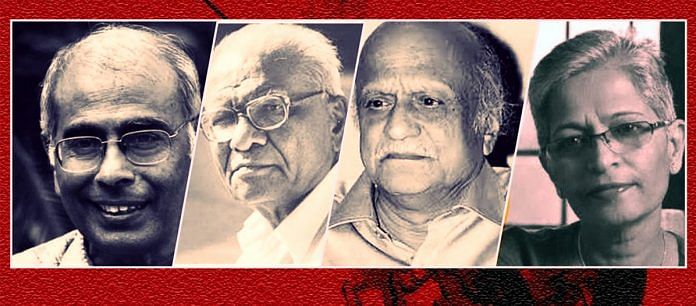Govind Pansare and Narendra Dabholkar stood for rational and scientific temper, and they were killed for it.
“We are witnessing a tragic phase in the country today. Citizens already feel that they can’t voice their concerns or opinions fearlessly. Are we going to see a day when everyone will need police protection to move around, or to speak freely?”
These words came from the Bombay High Court, which was hearing a plea filed by family members of Narendra Dabholkar and Govind Pansare, who are seeking a court-monitored probe in the two cases of coldblooded murder.
If you said these lines out without context, you’d be attacked by anonymous Twitter accounts claiming that you’re fear-mongering. You would get at least one ‘go to Pakistan!’ message, and if you’re a woman, a few sexually explicit remarks about what happens to ‘women like you in Saudi and all those countries you think are freer than India!’
Also read: ‘What happened with Gauri and Prof. Kalburgi is targeted assassination’
The moment you say anything about your fears about existing in this country, a legion of people makes sure they come true (at least, virtually). If you think this is an exaggeration, remember that is exactly what happened with Aamir Khan and his family.
These aren’t just statements made on the fly, though. A rising wave of intolerance and a stifling of free speech were noted by the Bombay High Court when the bench of Justices S.C. Dharmadhikari and Bharati Dangre asked, “What is happening in the state today? People come and torch buses, pelt stones, it is a free for all. What are your priorities? There is a state, and then there is a government. The government might change tomorrow, but what about the state that is home to millions of people? Will everyone need police protection tomorrow to speak their minds?”.
This fear that has been articulated by many in the past few years now finds concrete validation in the court’s words. These words are not the product of paranoid, left-leaning minds. They’re a real and tangible reaction to an obvious danger.
But in many cases, this declaration might just be too late.
Rationalist Dabholkar was shot dead in 2013 and Pansare, a member of the Communist Party of India, was killed in 2015. Both had a history of working on similar issues, often through intersecting capacities. More importantly, they both stood for rational and scientific temper, a culture of trying to better the status quo, and a fierce belief in the freedom of speech. They were killed for it, and they weren’t alone. M.M. Kalburgi and Gauri Lankesh were killed in similarly styled executions. The message is clear. If you speak about things that upset the current social order, you will be killed.
Also read: Would have had ‘intellectuals, secular thinkers’ shot dead if I was home minister: BJP MLA
The hatred building up in this country starts with the lack of empathy and the online threats that we brush off. It starts with the normalisation of hate – when we ‘debate’ the killing of a journalist on primetime instead of condemning it. It starts with the gleeful, vitriolic celebration of trolling against people like Swara Bhasker. It starts with a country that doesn’t blink when a union minister felicitates eight men convicted of lynching a man from a minority. It starts when we stop reacting with anger and slip into the complacency of apathy.
More is at stake than just our individual freedoms. We, as people, deserve better. We deserve to be able to speak. The only way to do that, as Martin Niemöller’s words stand witness, is to speak for those who’ve been silenced.
Maybe it would be good to re-write Niemöller’s words and customise it for today’s India.
First they came for the minorities, and I did not speak out—
Because I was not a minority.
Then they came for the journalists, and I did not speak out—
Because I was not a journalist.
Then they came for the entertainers, and I did not speak out—
Because I was not an entertainer.
Then they came for me—
And there was no one left to speak for me.
It’s time to take up our weapons of choice – radical empathy, conversation and kindness – to fight hate. Hate has always existed, but only when it goes unanswered does it flourish.
Harnidh Kaur is a poet.
Also read: India would benefit from curbing hate speech more than creating a new lynching law




Govt should ban the urban naxals/extremists like print